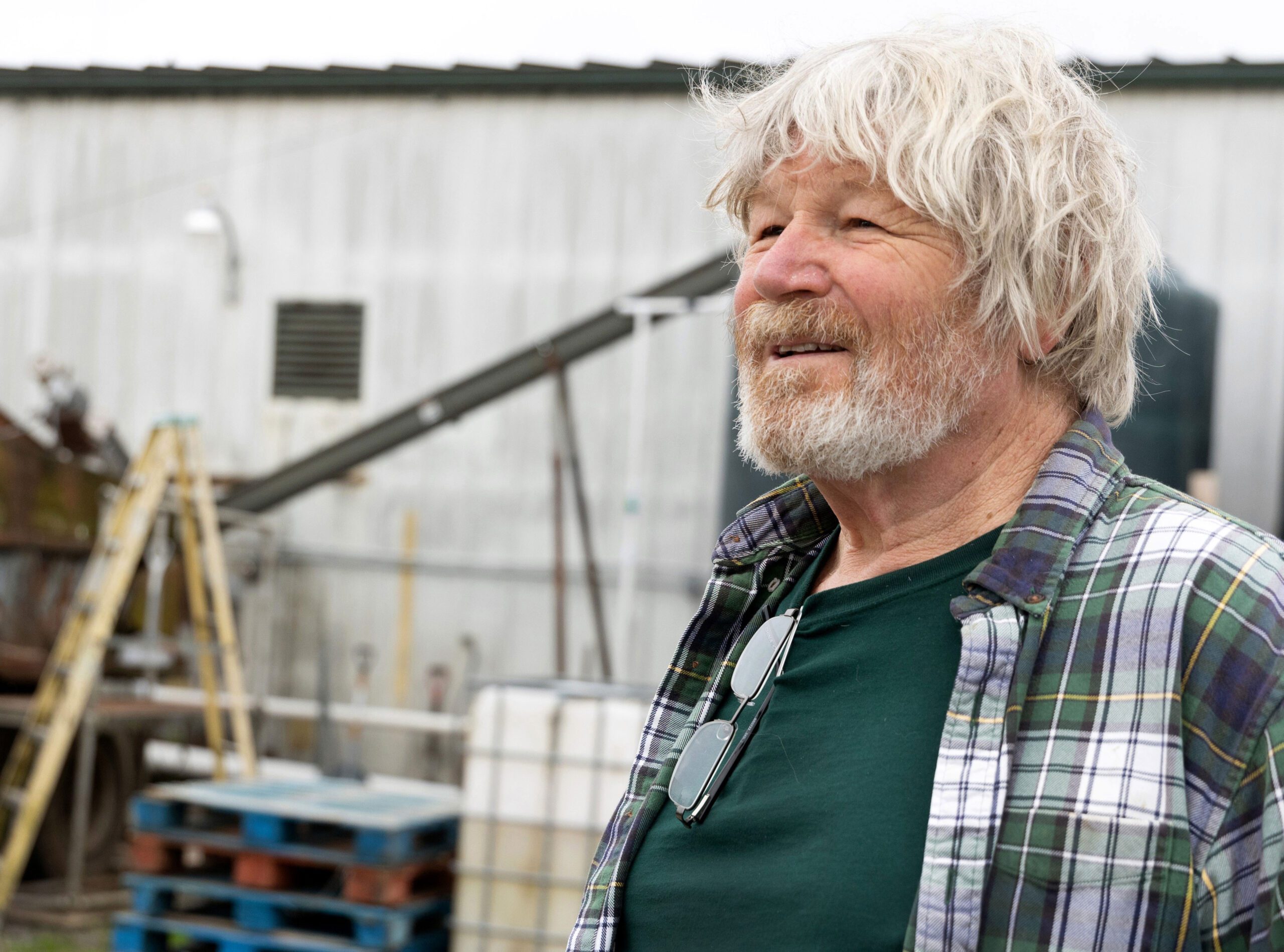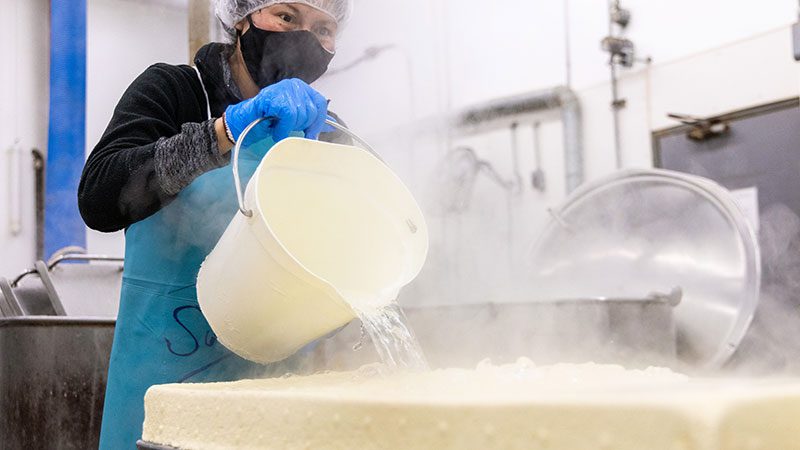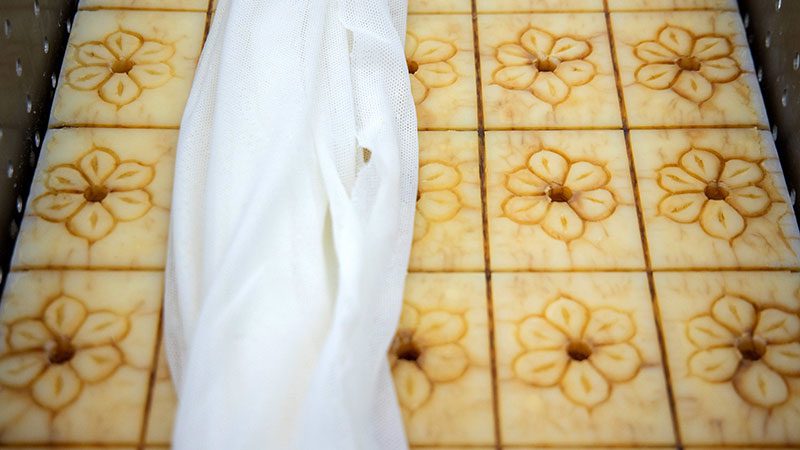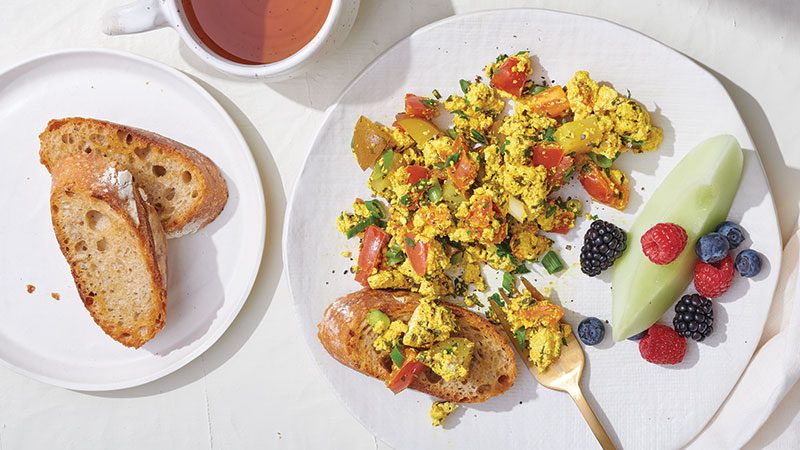Island Spring Organics and Changing the World
This article was originally published in September 2023

Every month or so, 50,000 pounds of U.S.-grown soybeans arrive at the Island Spring Organics plant on Vashon Island. Inside the small factory, workers soak, grind and cook the beans, stir coagulating masses of tofu with paddles, press them into molds imprinted with a dogwood blossom, deftly slice blocks by hand, and lift them into cartons bound for PCC and other outlets.
The scale has changed, but the basics have stayed much the same since Luke Lukoskie co-founded the tofu and tempeh company in 1976, a time when tofu was little-known outside of Asian households in the U.S. “Tofu is a beautiful secret we want everyone to know,” he told the Vashon-Maury Island Beachcomber in 1976, according to a 2022 book on tofu history. In the company’s early years, reporters writing about the plant inevitably felt a need to define and explain the mystifying-to-them food.
Lukoskie, raised in Woodway, was an administrative assistant to the University of Washington’s student body president and a founder of the Monte Cristo environmental institute. He ate a macrobiotic diet and lived in a shared house with roommates who included Randy Lee, PCC’s longtime manager (and eventual chief financial officer). Lukoskie soon joined PCC’s board of trustees, such a natural assignment at the time that he doesn’t remember how it came about.
“Seattle used to be a small town…” Lukoskie said recently. “Everybody knew everybody else, if you were doing anything that matters.”
And what mattered was big: “We were going to change the world,” he said. “We were looking for every single possible way that we could improve people’s lives.”
Influenced by a few factors—a friend who connected him with a literal spring on Vashon Island, an influential book (“The Book of Tofu” by William Shurtleff and Akiko Aoyagi)—he and then-partner Sylvia Nogaki founded Island Spring.


They had $200 between them plus a Visa card, which took them from an interim home in Arizona to California to buy equipment and then to Vashon to start the company. Nogaki developed a tofu recipe in the kitchen while Lukoskie built the plant with friends.
“I was a carpenter and I had electrician friends and plumber friends and welder friends,” he said. Together they built a tiny starting factory, about 14 feet by 14 feet. “We’ve always made tofu at night, so that we could deliver it as fresh as possible.”
The first batch was delivered Nov. 11, 1976, he recalled, to Community Produce, an organics distributor. PCC was its first retailer. Tofu was produced on smaller scales at a few outlets in the Chinatown-International District, a Seattle Times article from the 1970s noted, but not in such quantities.
Organics was another focus entirely, built into Island Spring’s production long before the National Organic Program even existed, Lukoskie said. “Knowing the importance of eating organically, primarily for us human beings, but secondarily, for the environment. I was interviewing the farmers and making sure that what we were buying was in fact organic, and getting certificates from them, statements that were rudimentary statements back in 1976.”
Sales were slow at first, Lukoskie said, until the company self-published a cookbook titled “Tofu Madness.” (The Sound Consumer recommended it to readers, along with recipes for curried tofu, tofu guacamole, “steamed tofu sauce” and more.) The company reported that 38,000 copies of the free book were distributed.
Tofu and tempeh don’t require explanations anymore. But Lukoskie is still imagining other ways the world might improve, such as a growing partnership with Chomp, a local energy company that takes byproducts from Island Spring’s tofu production and transforms them into organic renewable natural gas (along with organic fertilizer).
“We have a perpetual motion machine going here,” said Chomp founder Jan Allen. Allen compares the biodigester behind Island Spring’s factory to a mechanical cow, digesting the food waste and turning it into gas. Already, the tofu byproducts produce enough renewable products to power the factory boilers that make the tofu, along with plenty of other uses, from fueling a small number of cars, to fertilizing crops at a nearby farm owned by the island land trust, to powering a rooftop greenhouse whose harvests are donated to the local food bank. Ultimately, the project’s goal is to offset emissions from all the cars on Vashon Island. That would take more growth and investment for the energy farm partners, but it’d be in line with the history of the site.
As Lukoskie put it, “I have a company today after starting with $200, because people believed in the project and they believe in a local product.”

